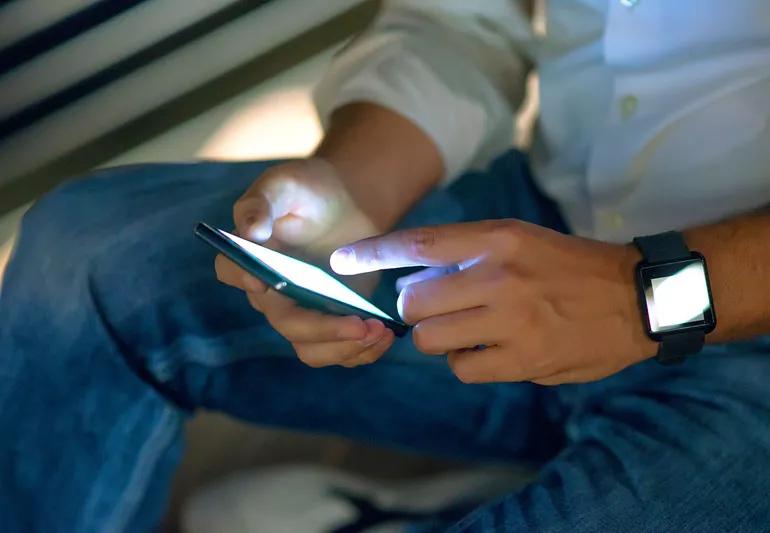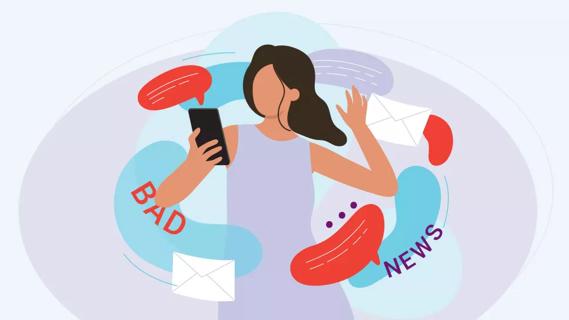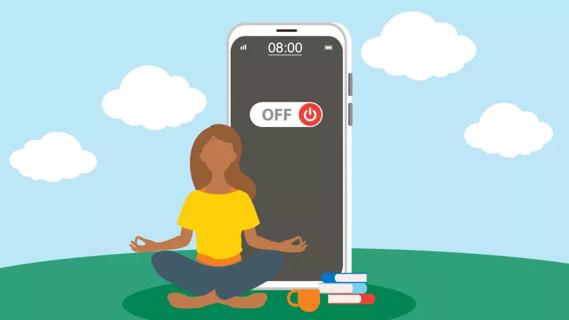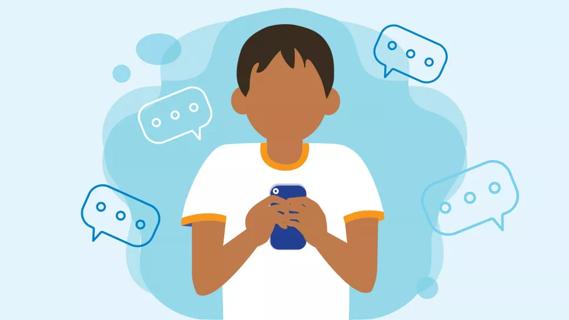An expert gives tips on how to cope with an overflowing inbox

Staying connected to other people is easier than ever. We can send a quick text, chat on social media, or even tape a voice memo or video. Of course, it’s easy to see why this chatter is so appealing. Studies show that positive social interactions can spur the production of dopamine, a chemical associated with pleasure and feeling good.
Advertisement
Cleveland Clinic is a non-profit academic medical center. Advertising on our site helps support our mission. We do not endorse non-Cleveland Clinic products or services. Policy
At the same time, because communication is so convenient, it’s easy to get overwhelmed by messages. If five people send you a quick hello, those greetings add up fast.
Enter email anxiety, a modern phenomenon stemming from our hyper-connected world that we’ve likely all experienced — whether it’s a time we were fearful of sending a message or clicking open on that important response. Psychologist Kia-Rai M. Prewitt, PhD, explores the causes of email anxiety — and provides tips on how to cope with your overflowing inbox.
Answering email can often feel like a chore because it’s something extra you have to manage on top of day-to-day activities.
“It adds to the list of things that you have to be responsible for,” says Dr. Prewitt. “For people who prefer text messages or social media, email represents one more way they have to communicate — and it might not be their preferred method of communication.”
However email anxiety “presents itself in multiple ways,” Dr. Prewitt says. “It could be related to feeling overwhelmed because your emails are piling up. It could be related to procrastination — for instance, if there’s something negative that you’re anticipating, or you’re afraid or worried about how to respond or address an issue in an email.”
Advertisement
People develop anxiety at all stages of an email’s lifespan. You might be nervous about sending an important message. When you don’t hear back right away, that can cause concern. And when you do get a response, you could be anxious to open it.
The quick pace of social media and texting also sets up unrealistic expectations for email response times. “If you send an email and you’re expecting an immediate response from someone — and instead you don’t hear back and are in limbo — that can cause anxiety,” Dr. Prewitt says.
Anyone prone to social anxiety — or even anxiety in general — could also be susceptible to email anxiety. “If you’re already worried about how people view you, what you write can make you anxious because you’re not sure how they might interpret something that you’re writing,” says Dr. Prewitt.
Email anxiety also often comes from mismatched expectations, she adds. “We all have different types of responsibilities at work, and there might be expectations about how or when you’re supposed to respond to emails. Someone might be anxious that other people have expectations about how or when they should respond.”
If you’re conscientious and pride yourself on making to-do lists — and then checking off things when you’re done — the pace and volume of email communication is also a stressor.
“If you naturally believe that responding to e-mails in a timely and thoughtful manner is a form of responsible behavior, then you could potentially have some anxiety if you feel like you’re not able to keep up with your responsibilities,” she says. “On the flip side, checking email can also become a distractor from other work tasks.”
It’s also incredibly easy to make mistakes when sending emails — whether that equates to an embarrassing typo, forgetting to send an attachment or spelling someone’s name incorrectly.
“People often find themselves in a time crunch when they’re responding to emails,” says Dr. Prewitt. “Having to hurry up and write an email can definitely lead to some anxiety. It’s easy to miss something or make an error, or question whether you’re using a tone that’s considered appropriate or offensive.”
Emails also lack the kind of vocal inflection and emotional context that clear up misunderstandings. For example, typing in all caps is viewed as yelling, while someone might think you’re rude if you do (or don’t) use punctuation or a specific greeting. “There could be some worry about whether or not your intention is perceived correctly in the email,” Dr. Prewitt says.
Advertisement
Tackling that pile of emails can feel overwhelming, although Dr. Prewitt does have tips on how people can remain calm while diving in. Plus, the ways you usually cope with stress or anxiety — for example, breathing exercises or calming techniques such as meditation — can also mitigate email anxiety. Prioritizing emails in order of importance is also helpful, since having a specific plan can make a larger task feel more manageable.
Think about your own email habits: You might not have time to respond to messages right away due to pressing deadlines, vacations or otherwise being away from your desk. Chances are, the same also holds true for other people. “If you send an email, it might take longer for a response to come in,” Dr. Prewitt says. “Just because you don’t get an immediate response doesn’t mean something is wrong.”
Dr. Prewitt suggests carving out a dedicated time each day to answer emails, as that communicates you’re not always available at all hours. “You’re setting some boundaries for yourself as to when you’re sending things,” she says. “People don’t have this expectation that you’re always available to send an immediate response.”
Admittedly, setting boundaries can be difficult because we’re so connected to email via our phones and computers. Outside of business hours, you might have to put your work phone or laptop out of earshot, or even turn the devices off completely, to keep yourself from checking messages.
Advertisement
Working outside regular business hours is sometimes unavoidable. However, many people are firm about not looking at work-related emails or texts at night or on weekends. Manage expectations about your availability. If you don’t check texts after five o’clock on Friday, be upfront about that.
Because our brains have to sift through so much information, shorter emails are better. “Be direct and concise,” Dr. Prewitt says, and suggests anywhere between three and seven sentences is a good length, depending on what type of information you want to communicate.
“For some people, using direct and concise language might create some anxiety because you might worry about the tone that you’re sending if it doesn’t come off as friendly or nice or warm,” Dr. Prewitt says.
While it’s tempting to compensate for this anxiety by sending longer emails or changing your tone, Dr. Prewitt says, “I think it’s probably best to err on the side of formality, unless there is a mutually-agreed-upon comfortable or familiar relationship with the recipient of the email.”
Every once in a while, you’ll receive an email that makes you irritated, upset or just plain mad. When that happens, don’t fire back some thoughts in the heat of the moment. “If you get a frustrating email, pause before you respond,” Dr. Prewitt says. “Take some deep breaths, so you don’t reply in anger.” Writing an email response, and then leaving it in your drafts folder to look at later, is another option. So is asking a trusted colleague to take a look before you hit send. “Take some time to reflect on what the issue is and what you want to communicate back in the email,” Dr. Prewitt says.
Advertisement
Receiving an email that you don’t understand understandably leads to anxiety. “Asking for clarification is totally appropriate if you’re not really sure what that person is trying to communicate to you,” Dr. Prewitt says. “It’s perfectly okay to respond and say, ‘I want to make sure that I understand what you’re asking me,’ or ‘I want to make sure that I’m replying appropriately. Is this what you’re asking?’”
Paradoxically, a quick phone call or video chat can alleviate email anxiety. A direct conversation can resolve issues quicker than a written back-and-forth.
And, if all else fails, recalibrate your perspective. With patients who are faced with anxiety, Dr. Prewitt says she’ll often talk through frightening scenarios by taking a step back. “If I’m speaking to a patient who would like to request a meeting with their supervisor or a colleague: “What’s the worst that can happen?’ The worst that can happen is they could say no,” she says. “And then, depending on who it is, I might ask, ‘What’s the likelihood that’s going to happen?’”

Sign up for our Health Essentials emails for expert guidance on nutrition, fitness, sleep, skin care and more.
Learn more about our editorial process.
Advertisement

It isn’t a recognized mental health disorder, but research shows that problematic social media use can negatively affect your mental health, self-esteem and sleep

Too much blue light, especially from digital sources, may lead to eye strain and computer vision syndrome

When done in excess, watching TV can disrupt your sleep and lead to physical inactivity and social isolation

Imagination, completing tasks and social interactions are all key benefits for your brain

They’re fun to watch, but medical TV shows are often more hype than reality — and you shouldn’t rely on them for factual medical information

Embrace mindfulness and practice checking your phone consciously, not compulsively

Identify your triggers, set ground rules for your break and start practicing mindfulness

Too much screen time and unrealistic expectations and perceptions and can lead to an increased risk of anxiety and depression

Even small moments of time outdoors can help reduce stress, boost mood and restore a sense of calm

A correct prescription helps your eyes see clearly — but as natural changes occur, you may need stronger or different eyeglasses

Both are medical emergencies, but they are very distinct events with different causes